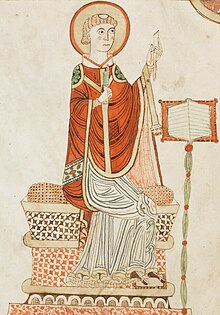Bede the Venerable | |
|---|---|
 The Venerable Bede writing. Detail from a 12th century codex | |
| Church Father, Doctor of the Church | |
| Born | c. 673[1] Kingdom of Northumbria, possibly Monkwearmouth in present-day Sunderland, Tyne and Wear, England[1] |
| Died | 26 May 735 (aged 61 or 62) Jarrow, Northumbria[1] |
| Venerated in | Roman Catholic Church, Eastern Orthodox Church,[2] Anglican Communion, and Lutheranism |
| Canonized | Declared a Doctor of the Church in 1899 by Pope Leo XIII, Rome |
| Major shrine | Durham Cathedral, England |
| Feast |
|
| Attributes | Holding the Historia ecclesiastica gentis Anglorum, a quill, a biretta |
| Patronage | English writers and historians; Jarrow, Tyne and Wear, England, Beda College, San Beda University, San Beda College Alabang |
| Influences | |
Bede (/biːd/; Old English: Bēda [ˈbeːdɑ]; 672/3 – 26 May 735), also known as Saint Bede, the Venerable Bede, and Bede the Venerable (Latin: Beda Venerabilis), was an English monk, author and scholar. He was one of the greatest teachers and writers during the Early Middle Ages, and his most famous work, Ecclesiastical History of the English People, gained him the title "The Father of English History". He served at the monastery of St Peter and its companion monastery of St Paul in the Kingdom of Northumbria of the Angles.
Born on lands belonging to the twin monastery of Monkwearmouth–Jarrow in present-day Tyne and Wear, England, Bede was sent to Monkwearmouth at the age of seven and later joined Abbot Ceolfrith at Jarrow. Both of them survived a plague that struck in 686 and killed the majority of the population there. While Bede spent most of his life in the monastery, he travelled to several abbeys and monasteries across the British Isles, even visiting the archbishop of York and King Ceolwulf of Northumbria.
His theological writings were extensive and included a number of Biblical commentaries and other works of exegetical erudition. Another important area of study for Bede was the academic discipline of computus, otherwise known to his contemporaries as the science of calculating calendar dates. One of the more important dates Bede tried to compute was Easter, an effort that was mired in controversy. He also helped popularize the practice of dating forward from the birth of Christ (Anno Domini—in the year of our Lord), a practice which eventually became commonplace in medieval Europe. He is considered by many historians to be the most important scholar of antiquity for the period between the death of Pope Gregory I in 604 and the coronation of Charlemagne in 800.
In 1899, Pope Leo XIII declared him a Doctor of the Church. He is the only native of Great Britain to achieve this designation.[a] Bede was moreover a skilled linguist and translator, and his work made the Latin and Greek writings of the early Church Fathers much more accessible to his fellow Anglo-Saxons, which contributed significantly to English Christianity. Bede's monastery had access to an impressive library which included works by Eusebius, Orosius, and many others.
- ^ a b c Cite error: The named reference
ASEEncBedewas invoked but never defined (see the help page). - ^ Hutchinson-Hall, John (Ellsworth). Orthodox Saints of the British Isles. Vol II (St. Eadfrith Press, 2014) p. 133
- ^ Cite error: The named reference
CM_xxvwas invoked but never defined (see the help page). - ^ Cite error: The named reference
Theowas invoked but never defined (see the help page).
Cite error: There are <ref group=lower-alpha> tags or {{efn}} templates on this page, but the references will not show without a {{reflist|group=lower-alpha}} template or {{notelist}} template (see the help page).